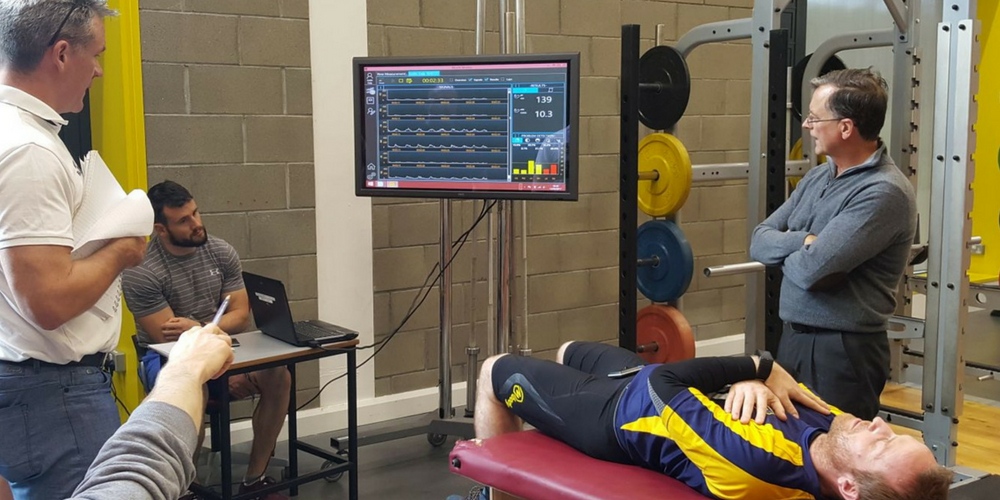I am always interested in knowing what drives a coach, a sports scientist or exercise specialist, athletic trainer or sport physiotherapist. Thus, when I meet a young coach or exercise professional, I frequently ask, ‘what is your passion?’ or ‘what drew you to this area?’. Ultimately, we come to a conversation about the classical continuum where the art of coaching might attract one individual, while the science or academic nature of the profession might be the attraction for another. We all know great ‘practitioners’ within the fields of S&C, sports science, athletic training or exercise performance and we also know great ‘scientists, academics and researchers’ with these fields. These are often role models for us all.

Dr. Liam delivering a functional screening practical to our Performance Science students.
Informed by Practice and Science
Here at Setanta College, we specialise in the middle ground between the practitioner and the scientist. This is where the prized skills of the practical coach meet the more scientific reasoned and focused scientific skills. Traditionally, the coach who had great skills in practical training and coaching methods and approaches was considered to be a sort of ‘artist’, while the sports scientist who had great scientific knowledge and who conducted research or who lectured was considered the more ‘scientist’ type. We like to approach our programmes by drawing both together such that we now call this mid-ground the ‘craft’ of coaching in sport or in human performance. Informed by both practice and science we feel that the ‘craft’ needs to be emphasised more and more today.
The great invasion and use of technology now helps us to forge a link between the practice and science of coaching and performance. Technology in sport and exercise performance is here to stay and it is evident all around us. It is not the preserve of the sports scientist or biomechanist any more. Non-sporting individuals both young and old use some form of technology that is satisfying their interest or even passion for moving, eating better or performing in whatever activity they enjoy, whether it is competitive or not. Thus sport performance and fitness, recreational fitness and health, wellness and general performance are all being impacted by technology.
Bridging the Divide

Setanta students using STATSports APEX to analyse game performance.
This was partly our inspiration and motivation in creating what we believe is a leading programme, which we call ‘Performance Coaching’. We are lucky enough to be associated with some of the giants of sport and exercise technology such as STATSports and ORRECO, two outstanding global companies that have their roots here in Ireland. In conjunction with other leading sport and exercise technology companies, we have been able to make great strides in bridging the divide between the art and science of coaching – not only in sport but also in human performance outside of sport.
During our Performance Coaching programme, we seek to make the complex technology easy to understand and to use, such that we no longer are unsure or uncertain of the role of technology. Our faculty of resident and international speakers, practitioners, scientists and coaches have all one thing in common, they are outstanding craftsmen and craftswomen. For example, Loren Landow who is of the NFL Broncos franchise, Prof Ian Jeffreys who created ‘GameSpeed’, Stephen Aboud who oversees Italian Rugby coaching development and who presided over, arguably, the best sport Academy in Rugby Union, the Irish development programme, as well as Des Ryan, Arsenal Academy Director and many other leading practitioners and exponents of the craft of coaching and performance regularly contribute to our educational programmes. I apologise if I have not listed the full faculty of coaches who regularly present on our programmes, but to all these great practitioners is their empathy and ability to communicate and motivate. This we feel is the ‘glue’ that fixes the soft skills to the hard technical skills so that performance still remains a human and relation pursuit above all else.

Coach Landow demonstrating speed drills at our Performance Coaching workshop week.
To give you a feel for our programmes, over recent months we have been highlighting how technology, once it is coupled with the ‘eye’ of coaching, can help us deal with issues that have bogged down not only coaches but also medics and physiotherapists for some years. Combining internal monitoring (specifically how muscles are contracting) with external monitoring (using GPS and other MEMES technology) and adding our softer skills to the overall management of a given programme, we can make great advances into reducing injury risk and enhancing performance. We would love to share our insights with you in this fabulous world where science, technology and empathetic coaching come together.
To learn more about the MSc in Performance Coaching, click here.


Leave A Comment